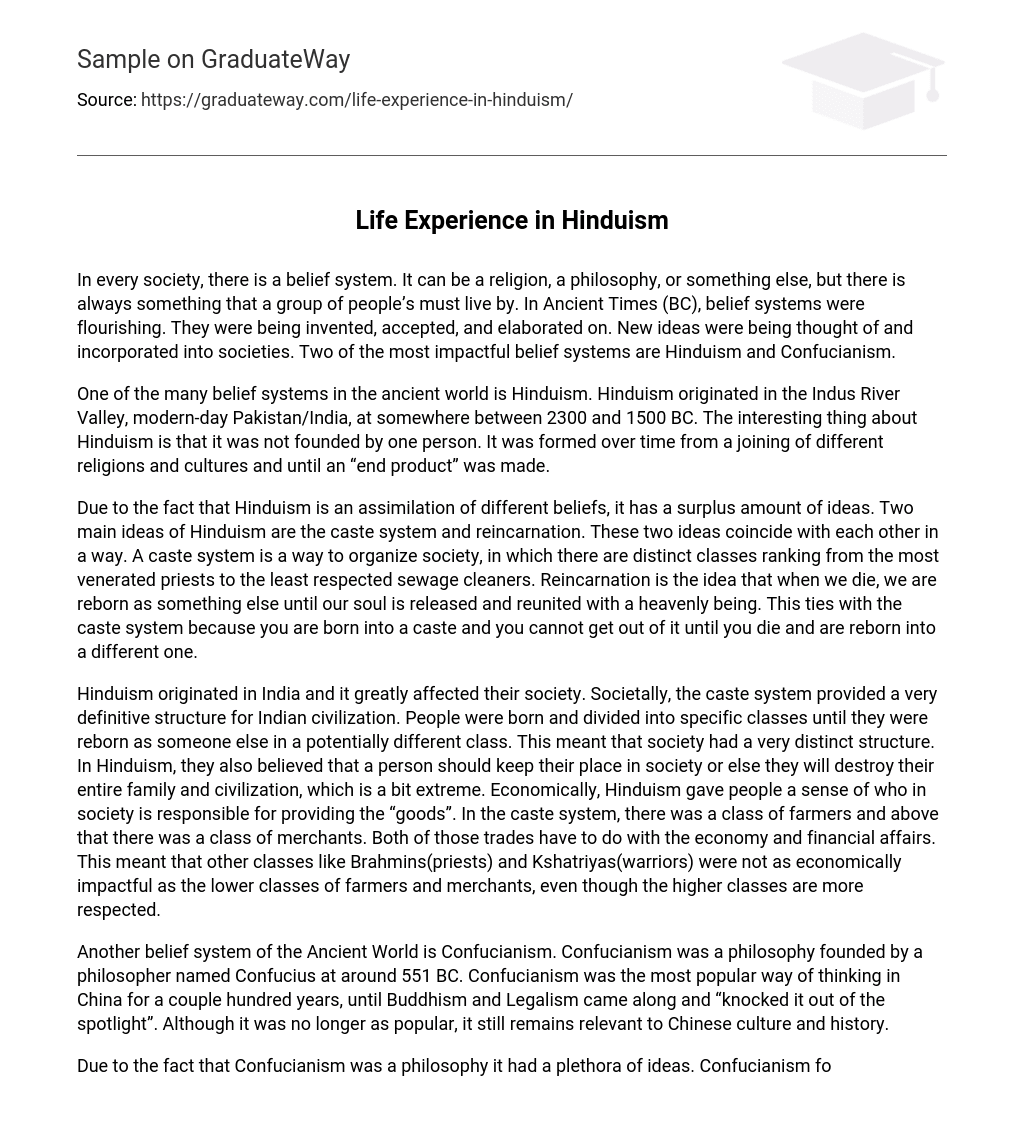In every society, there is a belief system. It can be a religion, a philosophy, or something else, but there is always something that a group of people’s must live by. In Ancient Times (BC), belief systems were flourishing. They were being invented, accepted, and elaborated on. New ideas were being thought of and incorporated into societies. Two of the most impactful belief systems are Hinduism and Confucianism.
One of the many belief systems in the ancient world is Hinduism. Hinduism originated in the Indus River Valley, modern-day Pakistan/India, at somewhere between 2300 and 1500 BC. The interesting thing about Hinduism is that it was not founded by one person. It was formed over time from a joining of different religions and cultures and until an “end product” was made.
Due to the fact that Hinduism is an assimilation of different beliefs, it has a surplus amount of ideas. Two main ideas of Hinduism are the caste system and reincarnation. These two ideas coincide with each other in a way. A caste system is a way to organize society, in which there are distinct classes ranking from the most venerated priests to the least respected sewage cleaners. Reincarnation is the idea that when we die, we are reborn as something else until our soul is released and reunited with a heavenly being. This ties with the caste system because you are born into a caste and you cannot get out of it until you die and are reborn into a different one.
Hinduism originated in India and it greatly affected their society. Societally, the caste system provided a very definitive structure for Indian civilization. People were born and divided into specific classes until they were reborn as someone else in a potentially different class. This meant that society had a very distinct structure. In Hinduism, they also believed that a person should keep their place in society or else they will destroy their entire family and civilization, which is a bit extreme. Economically, Hinduism gave people a sense of who in society is responsible for providing the “goods”. In the caste system, there was a class of farmers and above that there was a class of merchants. Both of those trades have to do with the economy and financial affairs. This meant that other classes like Brahmins(priests) and Kshatriyas(warriors) were not as economically impactful as the lower classes of farmers and merchants, even though the higher classes are more respected.
Another belief system of the Ancient World is Confucianism. Confucianism was a philosophy founded by a philosopher named Confucius at around 551 BC. Confucianism was the most popular way of thinking in China for a couple hundred years, until Buddhism and Legalism came along and “knocked it out of the spotlight”. Although it was no longer as popular, it still remains relevant to Chinese culture and history.
Due to the fact that Confucianism was a philosophy it had a plethora of ideas. Confucianism focused on the value of relationships and being a good person. Relationships meant that there were certain people that had to respect other people, like son and father, or servant and master. In Legalism, it is believed that people are born bad and need to be forced otherwise. Confucianism is the opposite of this. Confucianism believes in the kind-heartedness of people and their ability to do the right thing without being forced.
Confucianism was founded in China, where it flourished. It was the main belief in China for quite some time allowing for it to greatly impact Chinese society. In society, Confucianism showed people how society should work. In the eyes of the people, it made sense to respect relationships between themselves and others. Politically, Confucianism believed that a ruler should act in respectable way so that his subjects could follow by his example. Specific relationships also told people to respect people above them, such as their father and emperor. This made for a well-organized society in which people venerated who they were supposed to and followed rules established by their much respected emperor.
Therefore, belief systems were very impactful to the Ancient World. Hinduism showed India the divisions of society and how their lives extend beyond death. Confucianism promoted respect for others and general kindness. Belief systems shaped the way past societies thought and acted, eventually extending to modern day and how we think. Although our way of life isn’t exactly the same as Ancient India or China, there is a little bit of them in us.





